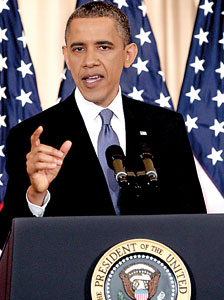US president Barack Obama in a landmark State Department speech on Thursday asserted that the US intends to throw its weight behind the forces pushing for democratic change across the Arab world, in a process that started in Tunisia and Egypt.
He said “it will be the policy of the United States to promote reform across the region, and to support transitions to democracy.” Going further, he signalled his intention to remove the suspicions that the US narrowly pursued its own ‘core interests’ at the expense of others. “A failure to change our approach threatens a deepening spiral of division between the United States and the Arab world.”
 |
| Barack Obama |
These remarks would seem to herald ‘winds of change’ in US policy that would be welcomed not just by people protesting against autocratic regimes of the North African and Gulf regions, but also by those struggling for similar reforms elswhere. But the policy shift outlined by him has met with mixed reactions, and questions persist on the emerging role of the US on the world stage.
The US actively supported a NATO led military intervention in Libya which is increasingly seen as having overstepped its mandate of protecting civilians, and instead serving a western agenda for regime change. Russian president Dmitry Medvedev on Wednesday told a press conference in Moscow he would not back a UN Security Council resolution condemning Syria.
He tied his remarks to disapproval of the handling of Libya, where he is quoted saying UN resolutions had been manipulated. The relentless NATO onslaught on Russia’s ally that continues in spite of reported civilian deaths and no end in sight, would seem to lend credibility to the Russian claims. Russia had abstained during the UNSC resolution on Libya and did not exercise its veto. How it will assert itself in the UN with respect to other crises in the region remains to be seen.
Obama made it a point to say that if America is to be credible it needed to acknowledge that some of its “friends in the region” like Bahrain and Yemen, have not “reacted to the demands for consistent change” along the lines he spelt out. But he was less than convincing in his assertions that “president Saleh needs to follow through on his commitment to transfer power,” and that in Bahrain “the only way forward is for the government to engage in dialogue.”
In his remarks on Arab-Israel peace negotiations the US president sought to show empathy with both sides. But in doing so it appears he risked angering both parties. Palestinians may have welcomed his statement that “the borders of Israel and Palestine should be based on the 1967 lines with mutually agreed swaps.” But this has already drawn a sharp retort from Israeli Prime Minister Benjamin Netanyahu who is quoted as saying this “is impossible since those borders are indefensible.” Obama did not mince his words in telling Israel that “the dream of a Jewish and democratic state cannot be fulfilled with permanent occupation.”
The Palestinians for their part were warned that the US would not support the declaration of statehood they are planning to make at the UN in September. This was seen by the US as a symbolic action to isolate Israel at the UN. Obama also raised concerns over the recent deal between Fatah and Hamas. (“How can one negotiate with a party that has shown itself unwilling to recognize your right to exist?”) A Hamas spokesman is quoted in the media as having responded to the speech saying the Arab world “doesn't need a lesson in democracy from the United States.”
No matter how Obama may seek to reassure the world, the US continues to be mistrusted in its perceived role of ‘global policeman.’ The killing of Osama bin Laden may have been defended by the US attorney general as an ‘act of self defence,’ but it is seen by others as a ‘targeted assassination’ that showed scant regard for the sovereignty of another state. The job was carried out by the Navy Seals, a crack team of commandos from the US Joint Special Operations Command. The Nation (02.05.11) in a detailed account of the team’s operations gives the following background:
“Both President Bush and President Obama have reserved the right for US forces to operate lethally and unilaterally in any country across the globe in pursuit of alleged high value terrorists. The Obama administration’s expansion of US Special Operations activities globally has been authorized under a classified order dating back to the Bush administration. Originally signed in early 2004 by then–Secretary of Defense Donald Rumsfeld, it is known as the “AQN ExOrd,” or Al Qaeda Network Execute Order.
The AQN ExOrd was intended to cut through bureaucratic and legal processes, allowing US special forces to move into denied areas or countries beyond the official battle zones of Iraq and Afghanistan. Gen. David Petraeus, who is poised to become director of the CIA, expanded and updated that order in late 2009. “JSOC has been empowered more under this administration than any other in recent history,” a Special Ops source told The Nation. “No question.”
With a defence apparatus that arrogates this kind of power to itself, the less powerful states of this world may be better off with a progressive such as Obama at the helm of its only superpower. But the post of Commander in Chief of the Armed Forces of USA is one that will change hands. And for those in the majority world the possibility that such power may some day devolve on a John McCain or Sarah Palin, is not a comforting thought.
The writer is a senior freelance journalist
|


